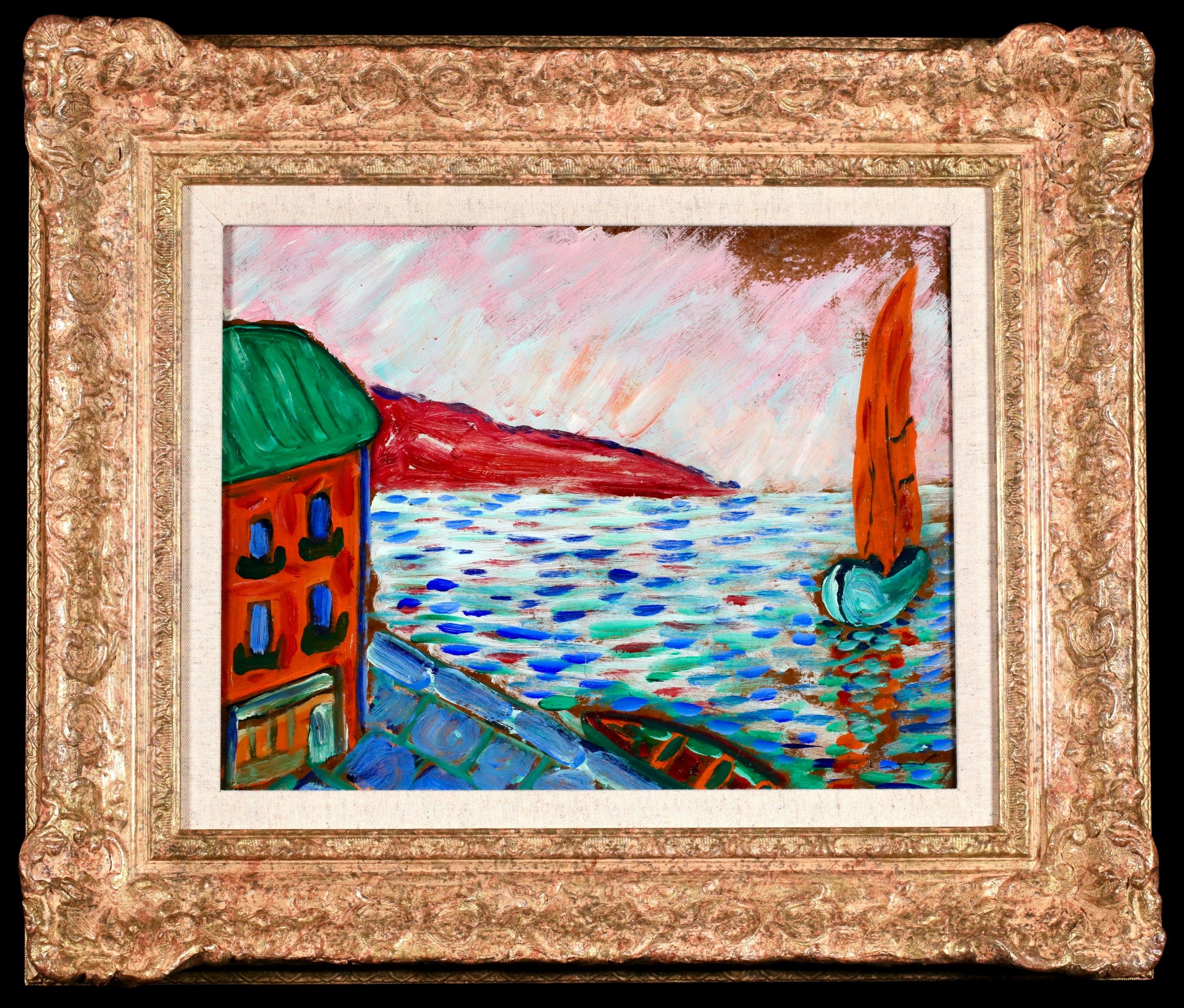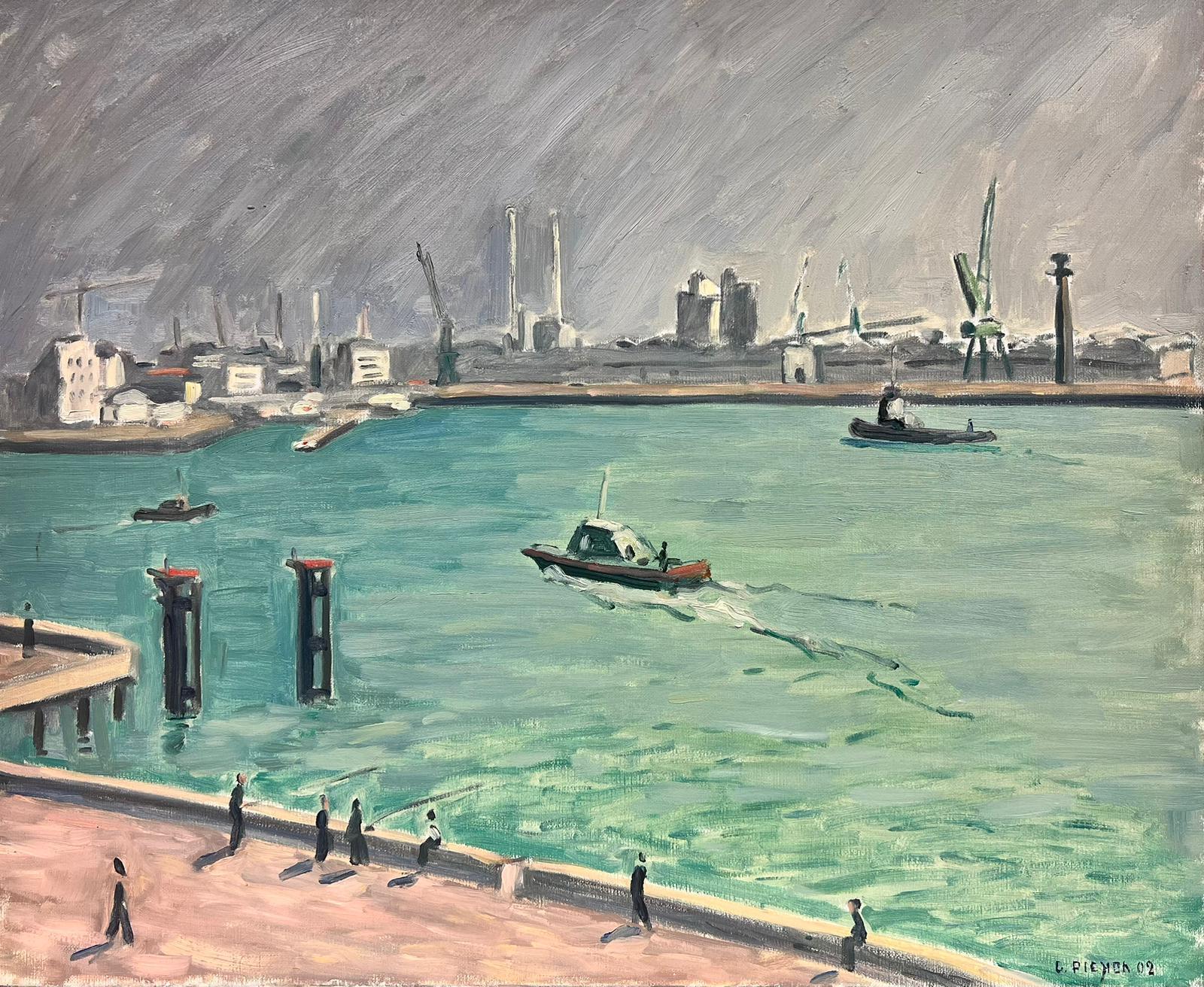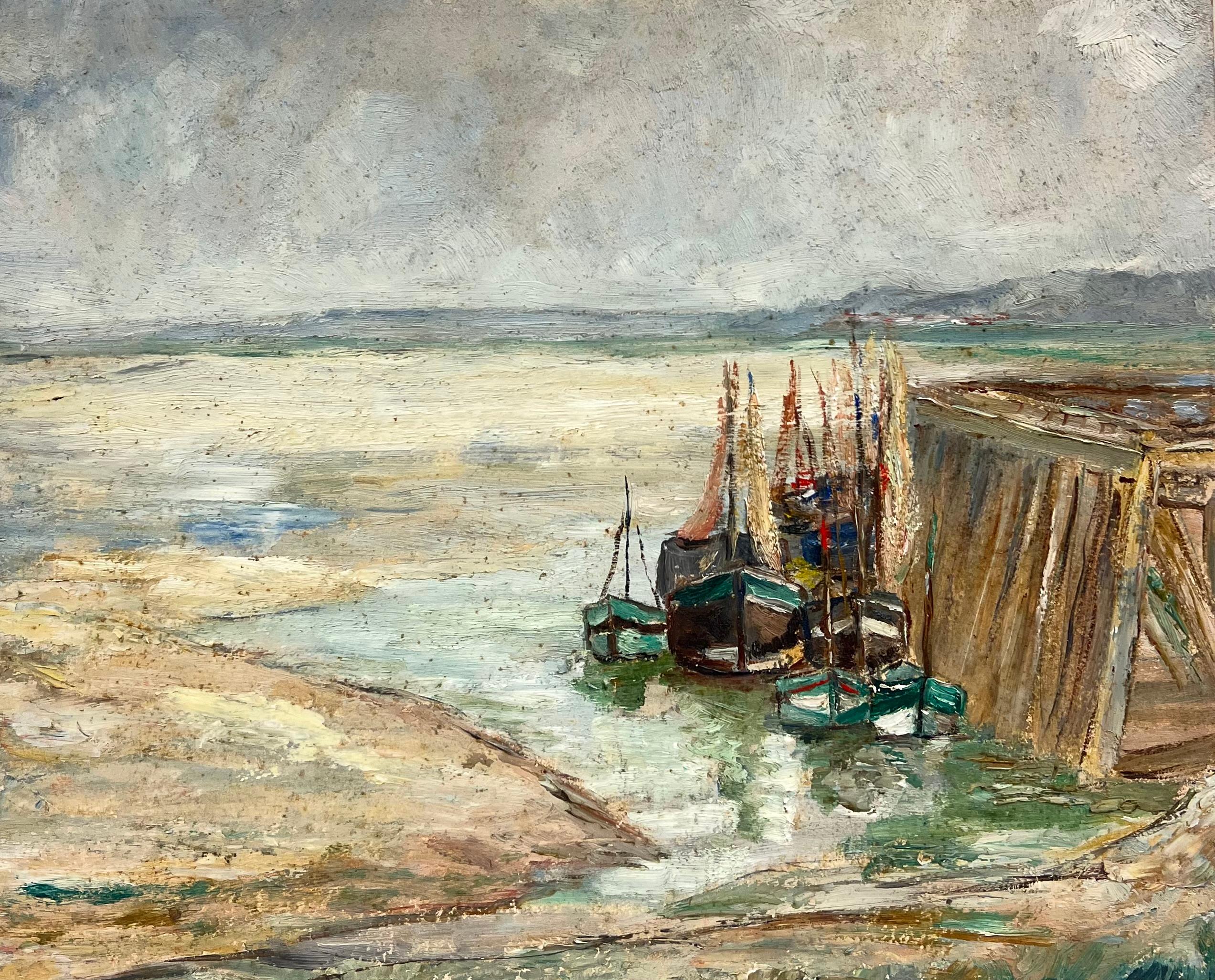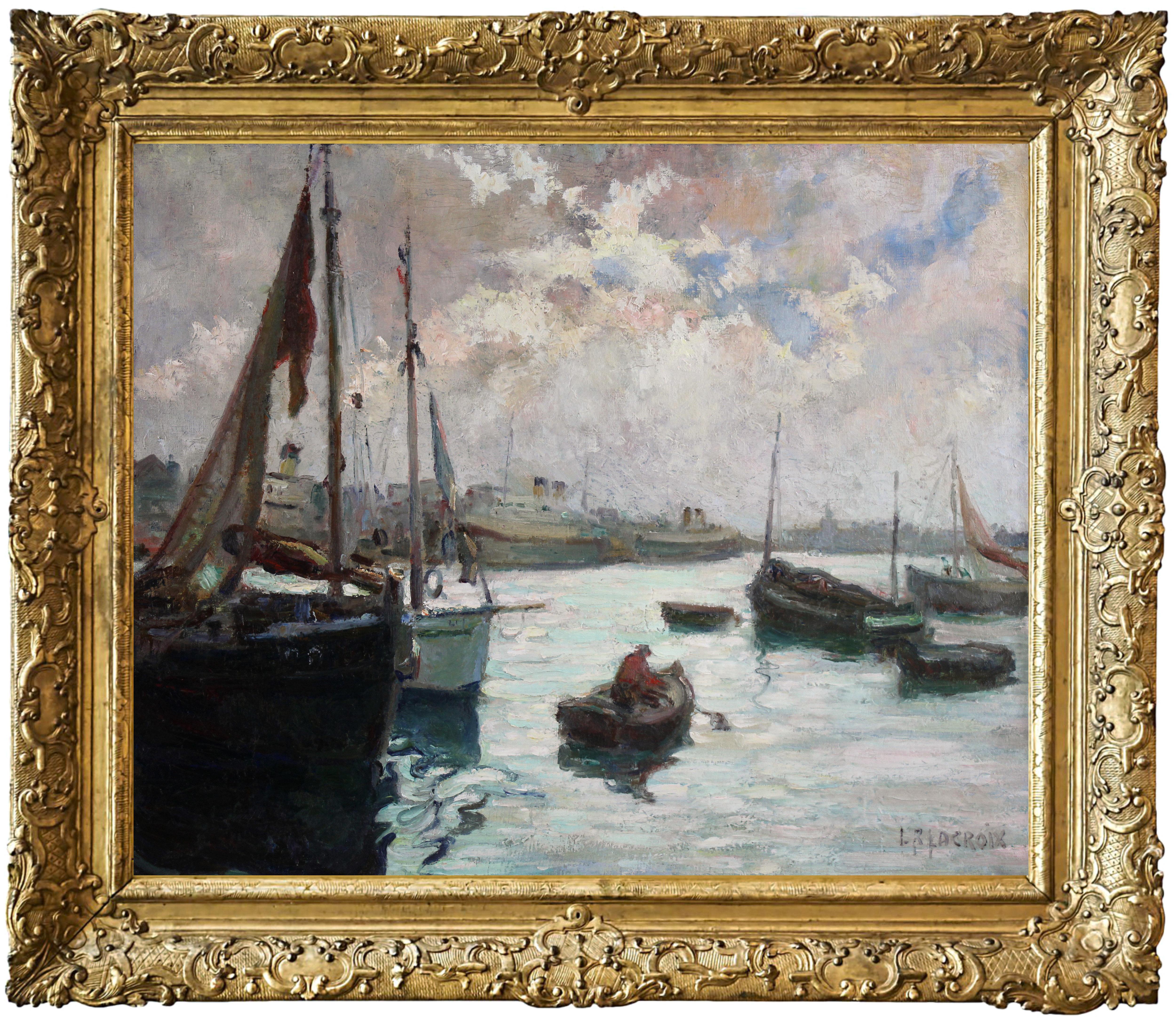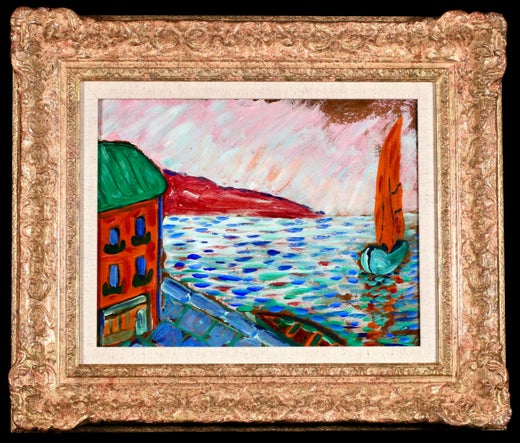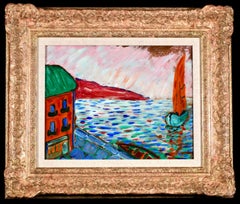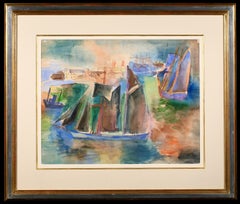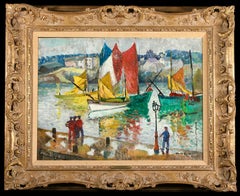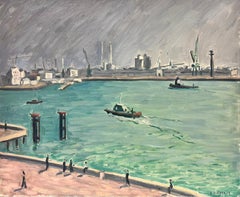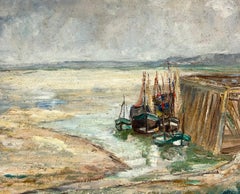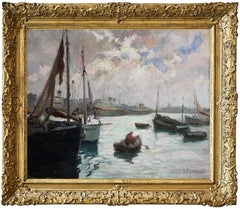Items Similar to Port of Le Havre & Sainte-Adrese- Post Impressionist Seascape Oil - Othon Friesz
Want more images or videos?
Request additional images or videos from the seller
1 of 17
Achille-Émile Othon FrieszPort of Le Havre & Sainte-Adrese- Post Impressionist Seascape Oil - Othon Friesz1921
1921
$27,596.62
£19,945
€23,523.80
CA$38,182.80
A$41,430.26
CHF 21,977.98
MX$508,760.32
NOK 271,796.22
SEK 257,390.70
DKK 175,595.41
About the Item
Signed and dated oil on canvas seascape by French post impressionist painter Achille-Emile Othon Friesz. The piece depicts a view of Le Havre, a port city in Normandy, France, located at the mouth of the Seine River on a stormy day. Sainte-Adresse is a coastal suburb located 2 miles (3.2 km) northwest of Le Havre city center. There are boats out at sea under an overcast sky and works on the beach to the foreground.
Signature:
Signed and dated 1921 lower right
Dimensions:
Framed: 31"x38"
Unframed: 26"x33"
Provenance:
Private French collection
The authenticity of this work has been confirmed by Mme. Odile Aittouarès
Achille-Émile Othon Friesz was the son of a family of sailors from Le Havre. From 1885 he often spent time in Marseilles visiting his maternal uncles. As a child he dreamed of going to sea, but from the age of 12 he developed a passion for art, and after secondary school he attended the École des Beaux-Arts in Le Havre. There, from 1896 to 1898, he studied under Charles-Marie Lhullier who had been a friend of Jongkind and whom, like Dufy and Braque, he remembered fondly throughout his life. Lhullier introduced his students to the work of Chardin, Corot, Géricault and Delacroix.
After receiving a bursary from the local authorities in 1898, he went to Paris and, while his friends Matisse, Rouault and Marquet studied under Gustave Moreau, enrolled at the École des Beaux-Arts at the studio of Léon Bonnat, where he was joined by Dufy. However, he scarcely attended the studio, preferring to go to the Louvre and make copies of the works of Clouet, Veronese, Rubens, Claude Lorraine and Delacroix. He did his military service in Paris in 1902 but continued with his art. Around this time he met Camille Pissarro and sought his advice.
As a young man he began to make frequent trips away, not necessarily travelling very far, but looking for subjects for his work, usually landscapes. Among the places he visited were the Creuse region around 1903, Antwerp in 1905, returning there with Braque in 1906, and La Ciotat, Cassis and L'Estaque in 1906-1907, again in the company of Braque. In Paris he frequently moved lodgings until 1914. He moved in with Henri Matisse at the Couvent des Oiseaux from 1905-1910, that is to say at the period when Fauvism was at its height. In 1908 he returned to his native Normandy to reimmerse himself in his early environment; he would return to the region throughout his life. He made a trip to Munich with Dufy in 1909, and visited Portugal in 1911-1912 and Belgium in 1912. In 1914 he was called up and assigned to technical services, not being demobilised until March 1919, although he did manage to maintain a certain independence. From 1914 until his death he lived in Paris at 73 Rue Notre-Dame-des-Champs, where he occupied Bouguereau's old studio. He made frequent trips to Cap-Brun near Toulon where, in 1923, he acquired a property called Les Jarres, as well as making numerous visits to Normandy and Le Havre.
In 1925 he received the highest commendation at the Carnegie Prize in Pittsburgh for Portrait of the Decorative Artist Paul Paquereau. Also in 1925, at the same time as Matisse, he was made a Chevalier of the Légion d'Honneur, rising to in Officier in 1933 and Commandeur in 1937. He was also made Commander of the Swedish order of Vasa in 1934. Throughout his life, Friesz was a teacher: from 1913 at the Académie Moderne; from 1929 at the Académie Scandinave; and from 1941 until his death at the Académie de la Grande-Chaumière.
Alongside his activity as a painter, he illustrated several works of literature, including: in 1920 Le Pacte de l'Écolier Juan by Jules Tellier; in 1924 Échelles de Soie by Jean Pédron; in 1926 Le Jardin sur l'Oronte by Maurice Barrès; in 1926 En Suivant la Seine by Gustave Coquiot; in 1929 Rouen by André Maurois; in 1931 The Song of Songs; in 1934 Poésies by Pierre de Ronsard; in 1945 Le Bouquet de la Mariée by Gabriel-Joseph Gros; in 1947 Paul et Virginie by Bernardin de St-Pierre; in 1949 Le Livre de Job by Pierre Poussard; in 1949 Petronius's Satyricon, and in 1949 a collection of 12 unpublished lithographs for Le Désert de l'Amour by François Mauriac. He also designed several pieces of decorative art: from 1906 to 1909 ceramics executed by Metthey among others; a façade for a private house in Le Havre; a china service for two for the Le Havre writer J.-G. Aubry; vases, dishes and plates; in 1912 four sets for La Lumière by Georges Duhamel, performed at the Odéon; in 1916 a screen for the Le Havre collector Léon Pédron; in 1918 panels for Pédron's dining room; in 1920 a mural entitled Children Dancing (Enfants Dansant); in 1920 Les Volières for the apartment of Vicomte Amédée de Flers; in 1935 Peace (La Paix), a Gobelins tapestry presented by France to the Palais des Nations in Geneva; in 1937 La Seine in collaboration with Dufy for the Palais de Chaillot, with each artist taking half of the river's course - From the Source to Paris by Friesz and From Paris to the Estuary by Dufy.
The Fauves were producing Fauve paintings before they knew it: it was not until the critic Louis Vauxcelles saw their work at the Salon des Indépendants in 1905 and mockingly used the word Fauve to describe it that the term was born. It is known that Vlaminck and Derain worked together and that the École de Chatou was composed of just these two artists. Friesz was living with Matisse and after his first trip to Antwerp in 1905, he returned in 1906 with Braque. In 1906-1907 Friesz and Braque went to La Ciotat to paint and there they met up with Matisse. The paintings Friesz produced in Antwerp are Fauve inasmuch as they are painted in pure colours and are more or less free of the divisionism of the Impressionists, although the draughtsmanship is fairly standard; these works include The Port, The Escaut, The Canals, The Dock with Sailing Ships and The Red Slipway. Those of Braque the following year, in particular Terrace on the Escaut, show great similarities with those Friesz painted of the same subject. Friesz was already avoiding the hardness of pure flat tints by graduating them in thin glazes, allowing the whiteness of the canvas to penetrate the transparency, a technique that came to characterise his entire Fauve period.
At La Ciotat Friesz and Braque adopted completely different Fauve styles, with Braque composing his paintings on horizontal and vertical orthogonals painted in small, regular, spaced-out touches, whereas Friesz developed his own personal rhythmical style of wide arabesques of colour in works such as The Bec-de-l'Aigle, Women Bathing and L'Estaque. Many of Friesz's Fauve works were produced in the south of France, and his Portrait of Fernand Fleuret also dates from this period.
When he returned to Normandy in 1908 the period that he described as his 'return to form' began; with compromise paintings such as Entrance to the Port of Honfleur, Côte de Grâce Landscape, The 'Bains Marie-Christine' in Le Havre and the great compositions characteristic of this period - Autumn Labours, Spring, Fisherman on a Rock and Women Bathing. His draughtsmanship retains something of the rhythm of the Fauve period, his figures following the lines of the landscape and the colour remaining clear and resonant. In 1909 he painted the Cirque Médrano series: The Trapeze Artist, The Clown and The Horsewoman. In the south of France he also painted the Olive Trees series. He made a trip to Munich with Raoul Dufy resulting in Winter in Munich. This was also the year of his first trip to Italy. Boat in a Rocky Inlet of 1910 marks one of the pivotal points between a totally rhythmic drawing style of sensual curves typical of his Fauve period and a reduced palette of muted ochres, browns and blues. From 1910 onwards, the final traces of Fauvism become less and less apparent in his work. His use of colour follows the same course, towards the transcription of reality, with broken tones, ochres and browns.
After his demobilisation, as well as in his studio in Paris, Friesz spent time in his house in Toulon, returned to Normandy and Le Havre and continued to make frequent, often local, forays in search of new subjects: in 1919 to Jura, producing the series Forests, Pine Trees, Road in the Snow and Invitation to Skate; in 1920 to Italy producing Piedmont Village, Florence Grape Pickers; in 1920 to Le Havre, producing The Étretat Cliffs, People Bathing at Étretat; in 1923 to his house in Toulon, producing View of Coudon, Women Bathing, Grape Harvesting, Jars; in 1924 he painted the Large Nude (which he exhibited at the Salon d'Automne the same year) and landscapes of Toulon; in 1928 he made a trip to Algiers, producing The Algiers Kasbah and its Phantoms; in 1931 to Annecy, producing Women Bathers by a Lake; in 1934-1935 to Dinan and St-Malo producing The Great Dinan Viaduct, The Dock with the Terre-Neuvas, After Bathing; in 1936 to Honfleur; in 1941-1944, remaining in Paris because of the war, he painted mainly still-lifes, including Studio Corner, Earthenware. In 1946 he returned to Honfleur; and in 1947 to La Rochelle producing The Port Tower, Tuna Boats, The Red Sail.
Numerically Friesz's work is dominated by landscapes but it should be remembered that throughout his career he tackled more ambitious compositions and appeared to do so with great ease. These include Boat in a Rocky Inlet of 1910 with its frolicking women bathers, Allegory of War of 1915 executed in 24 hours, Invitation to Skate of 1919, numerous paintings of Women Bathing over several periods and much later Women beside a Pond of 1944, which clearly demonstrates his attachment to Cézanne.
He exhibited at the Salon des Artistes Français from 1901 to 1903 and then at the Salon des Artistes Indépendants. From 1906 he exhibited annually at the Salon d'Automne, of which he later became a committee and jury member. In 1923 he took part in the founding of the Salon des Tuileries and became head of two of the Salon's sections. His work has been exhibited at countless group exhibitions all over the world. Among the most recent thematic exhibitions is Fauvism in Black and White. From Gauguin to Vlaminck, Fauvist Engraving and its Setting (Le Fauvisme en Noir et Blanc. De Gauguin à Vlaminck, l'Estampe des Fauves et son Environnement) at the Musée d'Art Moderne in Villeneuve d'Ascq in 2001.
He also showed his work in numerous solo exhibitions in Paris: his first in 1904 at the Galerie des Collectionneurs and another the same year at the Société des Peintres du Paris Moderne; in 1905 at the Galerie Berthe Weill; under contract at the Galerie Druet from 1907; with the Galerie Katia Granoff from 1924; and from December 1939 until his death with the Galerie Pétridès. He exhibited in Paris in other galleries than those with which he was contracted, and outside Paris he held solo exhibitions in 1913 at the Cassirer gallery, Berlin; in 1921, 1928, 1936 and 1958 in London; in 1921 and 1950 in Le Havre; in 1925 and 1929 in Brussels; in 1929 and 1938 in New York; in 1930 in Chicago; in 1938 in Zurich; and in 1948 in Lucerne and Geneva. His posthumous exhibitions and retrospectives include: a tribute in 1949 at the Salon d'Automne in Paris; a retrospective in 1950 at the Galerie Charpentier in Paris; an exhibition in 1950 in Geneva and again in 1953 at the Musée d'Art et d'Histoire; in 1950 at the Musée de Toulon; in 1950 in Marseilles; in 1951 at the Algiers museum; in 1951 at the Musée d'Honfleur; in 1956 at the Musée de Dieppe; in 1979 at the Musée de la Rochelle and the Musée de La Roche-sur-Yon; in 1989 the E. Othon Friesz, Rétrospective at the Galerie Katia Granoff, Paris; 1995, Émile Othon Friesz. Périodes Fauve et Cézannienne (1906-1920) at the Galerie Larock-Granoff in Paris.
Museum and Gallery Holdings:
Albi: drawings
Arles: drawings
Baltimore: Women Bathing (1926)
Copenhagen: Madame and Jacqueline F.
Copenhagen (Statens Mus. for Kunst): Motherhood (1914)
Geneva (MAH): St-Cirq-Lapopie (1946)
Geneva (Petit Palais): Corvette Entering Port (1906); Women Bathing (1907)
Grenoble: Allegory of War (1915); Grape Harvesting (1923); Le Coudon (1923)
Le Havre: Landscape
Leeds (City AG): Honfleur (1937, oil on canvas)
Lille (Mus. de Picardie)
Moscow: Rouen Cathedral (1908)
New York (MoMA)
Oslo: Autumn Labours (1908); The Red Street (1905)
Paris (MNAM-CCI): La Ciotat (1906); L'Estaque (1906); Portrait of Fernand Fleuret (1906); Portrait of Madame Andrée Othon Friesz (1923); Landscape of Méounes, Var (1925); Port of Dieppe (1930)
Paris (Mus. de l'Armée): The French Enter Strasbourg (1918); Maréchal Joffre on Horseback (drawings)
Paris (Mus. de l'Aviation): Air Force Camps during the 1914-1918 War (studies)
Poitiers: drawings and lithographs
St-Malo: Women Bathers by the Sea; The Old Town of St-Malo before the Destruction Caused by the 1939-1945 War (drawings)
Stockholm: Port of Honfleur
Toulon: The Artist's House at Toulon (1919); Nude (drawings)
Troyes (MAM, Pierre and Denise Lévy donation): L'Estaque (1906)
Zurich: Cassis Landscape (1909)
- Creator:Achille-Émile Othon Friesz (1879 - 1949, French)
- Creation Year:1921
- Dimensions:Height: 31 in (78.74 cm)Width: 38 in (96.52 cm)
- Medium:
- Movement & Style:
- Period:
- Condition:Very good condition.
- Gallery Location:Marlow, GB
- Reference Number:Seller: LFA05041stDibs: LU415316484502
Achille-Émile Othon Friesz
Othon Friesz was a native of Le Havre France 1879-1949. He was a French artist of the Fauvist movement. He was a good friend of Raoul Dufy and met Matisse, Marquet and Rouault and exhibited with them in 1907. In his later years he painted in a style very different than his earlier years. He respected Cezanne's style of logical composition, simple tonality, solidity of volume and distinct separation of planes and a baroque flavor to his style. He is known for Fauve and traditional painting, landscapes, still lifes and figurative style. He admired the works of modernists. Hi works are in major museums throughout the world.
About the Seller
5.0
Gold Seller
Premium sellers maintaining a 4.3+ rating and 24-hour response times
Established in 2001
1stDibs seller since 2016
708 sales on 1stDibs
Typical response time: <1 hour
- ShippingRetrieving quote...Shipping from: Marlow, United Kingdom
- Return Policy
Authenticity Guarantee
In the unlikely event there’s an issue with an item’s authenticity, contact us within 1 year for a full refund. DetailsMoney-Back Guarantee
If your item is not as described, is damaged in transit, or does not arrive, contact us within 7 days for a full refund. Details24-Hour Cancellation
You have a 24-hour grace period in which to reconsider your purchase, with no questions asked.Vetted Professional Sellers
Our world-class sellers must adhere to strict standards for service and quality, maintaining the integrity of our listings.Price-Match Guarantee
If you find that a seller listed the same item for a lower price elsewhere, we’ll match it.Trusted Global Delivery
Our best-in-class carrier network provides specialized shipping options worldwide, including custom delivery.More From This Seller
View AllEtude Barque au Quai - Normandy - Post Impressionist Seascape Oil - Othon Friesz
By Achille-Émile Othon Friesz
Located in Marlow, Buckinghamshire
Signed oil on paper laid on panel seascape c.1907 by French post impressionist painter Achille-Emile Othon Friesz. The piece is a study of a view of a boat in a quay at Normandy, Fra...
Category
Early 1900s Post-Impressionist Landscape Paintings
Materials
Oil, Panel, Laid Paper
Le Port due Havre - Post Impressionist Landscape Watercolor by Jean Dufy
By Jean Dufy
Located in Marlow, Buckinghamshire
Signed and dated post impressionist watercolor on paper seascape by French painter Jean Dufy. This colourful piece depicts sail boats at the port of Le Havre in France - a commercial...
Category
1920s Post-Impressionist Landscape Paintings
Materials
Paper, Watercolor
Harbour at St Ives - Impressionist Figures Seascape Oil by Richard Hayley Lever
By Richard Hayley Lever
Located in Marlow, Buckinghamshire
Signed figures in landscape oil on board by Australian-American impressionist painter Richard Hayley Lever. The work depicts brightly coloured sailing boats in the harbour of St Ives...
Category
Early 1900s Impressionist Figurative Paintings
Materials
Oil, Canvas
Stormy Weather - Honfleur - Post Impressionist Oil, Seascape by H de Saint-Delis
Located in Marlow, Buckinghamshire
A wonderful oil on canvas circa 1908 by French post impressionist painter Henri Liénard de Saint-Délis depicting a boat docked at the harbour in the harb...
Category
Early 1900s Post-Impressionist Landscape Paintings
Materials
Oil, Canvas
Grosse Mer - Etretat - Impressionist Seascape Landscape Oil by Maxime Maufra
By Maxime Maufra
Located in Marlow, Buckinghamshire
Impressionist oil on canvas seascape painting circa 1895 by French artist Maxime Maufra. This stunning work depicts a sailing boat on a vast ocean. The choppy water is painted in greens and blues. The white clouds rolling across the blue sky are beautifully shaded in purple tones.
Signature:
Signed lower left and titled on original label verso
Dimensions:
Framed: 22"x25"
Unframed: 15"x18"
Provenance:
This work is included in the catalogue raisonne of Maxime Maufra under reference 284
Durand-Ruel, Paris (acquired directly from the artist on 5 April 1895)
Durand-Ruel Galleries, New York (acquired from the above in 1895)
Marlborough Fine Arts, Ltd., London (acquired after 1949)
Dr. Renate Davis, London (acquired from the above)
Lyon & Turnbull London, 28 November 2013, lot 111 (consigned by the above)
Private Collection, New York (acquired from the above sale)
Sotheby's New York, 15 November 2017, lot 101 (consigned by the above)
Maufra spent several years in England, notably in Liverpool, with his father, who wanted him to become a tradesman. He decided to take up painting instead and returned to France in 1883, attracting the attention of Octave Mirbeau in his very first exhibition, and subsequently being noticed by Frantz Jourdain in 1894 and Fontenais in 1901. In 1886, he successfully exhibited two seascapes at the Salon, following which he visited Brittany in 1890, making the acquaintance of Gauguin and Sérusier in Pont-Aven; he collaborated with them on the decoration of the Pouldu Inn in 1894. He maintained his acquaintance with the Nabis group artists Henry Moret and Gustave Loiseau. He travelled in l'Isère, Belgium, and Algeria (1913), as well as Paris, the Ile de France, Brittany and Normandy. From 1895, the Galerie Durand-Ruel assured the success of his work.
Maufra settled in Montmartre for about ten years during which he painted the old quarters of Paris, often around the church of St Séverin. He then turned to Brittany and Normandy for inspiration in keeping with a resolve to paint only from nature, his seascapes in particular finding favour. The influence of the Nabis on his work remains limited except in the 'synthetic' organisation of the composition. He was an admirer of Sisley and Pissarro, whose influence can be seen in his paintings. Maufra, like Valtat, went to some extent beyond Impressionism to become a forerunner of Fauvism in his use of colour.
An important retrospective exhibition of Maufra's work, prefaced by René Domergue, was organised in Paris around 1950. In 2001, his work was represented in the exhibition Painters and the Sarthe Region ( Les Peintres et la Sarthe) held at the Musée de la Reine Bérengère (for the 19th century) and the Abbaye de l'Épau (for the 20th century) at Le Mans. In 2003, his work appeared in the group exhibition Brittany, Land of Painters ( Bretagne, Terre des Peintres) at the Musée des Beaux-Arts in Vannes.
Museum and Gallery Holdings:
Bergues: Seascapes
Boston: Dusk in Douarnenez; Departure of Fishing Boats
Buffalo: Transport Quittant Le Havre
Chicago: Douarnenez the Town of Light
Cholet: Flood
Cincinnati (AM): The Coast, Bay of Douarnenez (Vue de Douarnenez) (painting)
Helsinki: St-Guénolé
Le Havre: Moonrise in Brittany
Manchester: Springtime in Lavardin
Montpellier: Hills of Morgat
Mulhouse: Low Tide
Nantes (MBA): La Prairie d'Amont (1888, oil on canvas); Pointe du Raz; Heavy Swell; The Loir Dam in Poncé (oil on canvas)
Paris (Mus. d'Orsay): Brittany Landscape...
Category
1890s Impressionist Landscape Paintings
Materials
Canvas, Oil
La Rochelle - Post Impressionist Landscape Oil by Clarence Montfort Gihon
Located in Marlow, Buckinghamshire
Signed and titled oil on board coastal landscape circa 1910 by American post impressionist painter Clarence Montfort Gihon. The work depicts a view of tuna boats in the port at La Ro...
Category
1910s Post-Impressionist Landscape Paintings
Materials
Oil, Board
You May Also Like
French Impressionist Signed Oil Painting Boats in Busy Industrial Harbour Port
Located in Cirencester, Gloucestershire
The Port
by Guy Pichon (French 1933-2007)
oil on canvas, unframed
signed
canvas: 21 x 26 inches
provenance: private collection, France
The painting is in...
Category
21st Century and Contemporary Impressionist Landscape Paintings
Materials
Oil
Vue Du Vieux Port De Dieppe (France), 1920-30 - oil paint, 98x116 cm., framed
By Leopold Levy
Located in Nice, FR
Oil on canvas, signed lower left
Henri-Léopold Lévy (23 September 1840, Nancy - 29 December 1904, Paris) was a French painter of Jewish ancestry, known pr...
Category
1920s Post-Impressionist Figurative Paintings
Materials
Oil
Harbour at Low Tide with Boats by the Pier 1930's French Impressionist
Located in Cirencester, Gloucestershire
Low Tide Boats
Simone Forge 1930's French Impressionist
oil on board unframed
board: 13 x 16 inches
Provenance: private collection
Condition: great condition
For more any more in...
Category
Early 19th Century Impressionist Landscape Paintings
Materials
Oil
French oil painting on canvas " Vibrant harbor scene in Dieppe "
Located in Gavere, BE
French oil painting on canvas " Vibrant harbor scene in Dieppe "
Additional information about the work:
Title: Vibrant harbor scene in Dieppe
Medium: oil on canvas
Signature: signe...
Category
1920s Impressionist Landscape Paintings
Materials
Canvas, Oil
Promenade Le Havre Harbor French 1950s Framed Oil Painting Mid 20th Century
By Fred Pailhès
Located in Sutton Poyntz, Dorset
Alfred Henri Pailhès.
French ( b.1902 - d.1991 ).
Rendez-Vous Des Havrais Pour Leur Promenade Dominicale.
Oil On Panel.
Signed Lower Left.
Image size 12.4 inches x 15.6 inches ( 31.5...
Category
Mid-20th Century Post-Impressionist Landscape Paintings
Materials
Oil, Board
River port oil painting european art seascape urbanscape France
By Rafael Duran Benet
Located in Barcelona, Barcelona
Rafael Duran Benet (1931-2015) - River port - Oil on canvas on board
Oil measurements 22x27 cm.
Frame 24x29.
Rafael Duran Benet (Terrassa, 1931 - Barcelona, 2015) is a Catalan paint...
Category
1960s Post-Impressionist Landscape Paintings
Materials
Oil, Board, Canvas
$502 Sale Price
30% Off
More Ways To Browse
Antique Kunst
Antique Invitations
Antique Amour
Gobelin Antique
Gobelin Tapestry
Gobelins Tapestries
Boat Black And White Sailing
Decorative Plates Set Of 2 Large
De Grace
Antique Pickers
Le Bouquet
Cirque Antique
Gobelins French Tapestry
French Marechal
Achille Emile Othon Friesz
Bain Marie
Paul Et Virginie
Scottish Sheep
